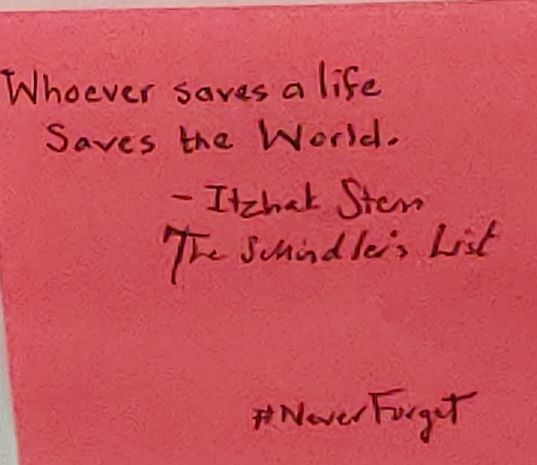
#NeverForget. Tikkun Olam–to mend, repair, and transform the world.
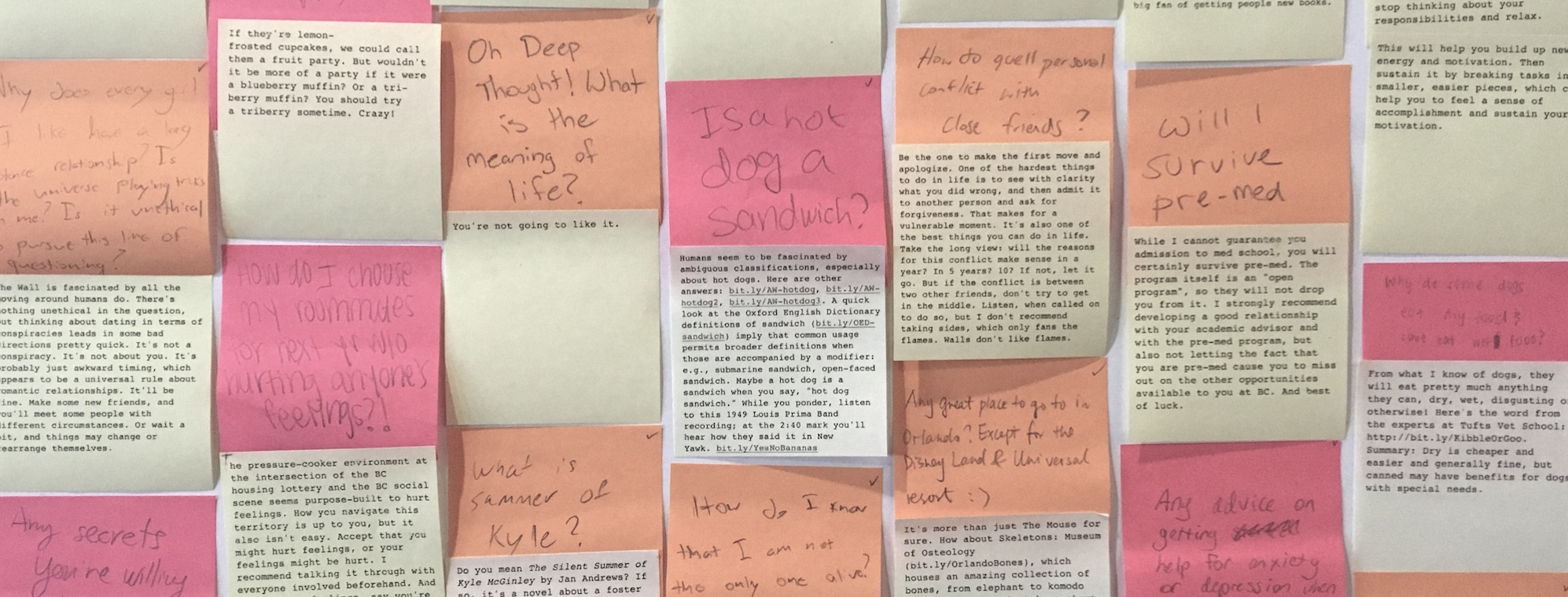
Answering questions at Boston College O’Neill Library

#NeverForget. Tikkun Olam–to mend, repair, and transform the world.
![Why do I exist? [response: (you're wanted + loved ❤️)]](https://library.bc.edu/answerwall/wp-content/uploads/2020/01/012720-2.jpg)
I think the response is lovely, and gets most of the way there. Here’s the other part: you also love in return.
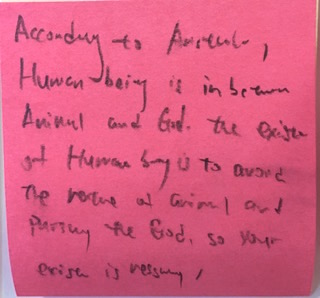
Yes! That, too. So, you see, there are many, many possible reasons for you to exist.
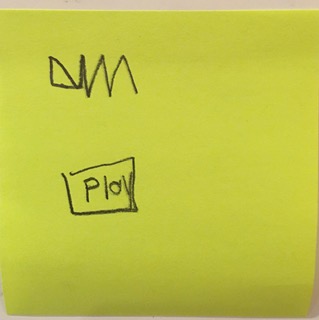
Play is indeed a state of mind. Thanks for the reminder.
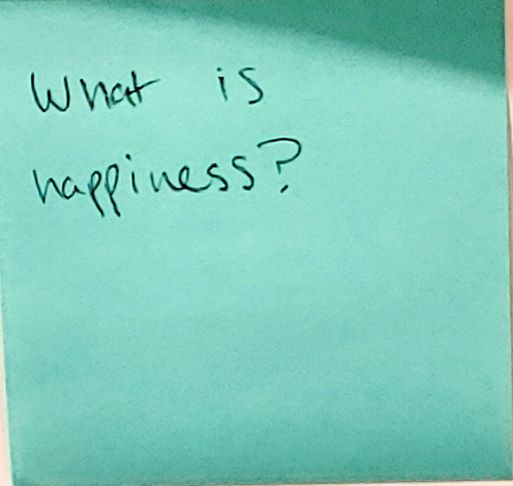
One of my helpers has this to share: “Let us be grateful to the people who make us happy; they are the charming gardeners who make our souls blossom.” ― Marcel Proust
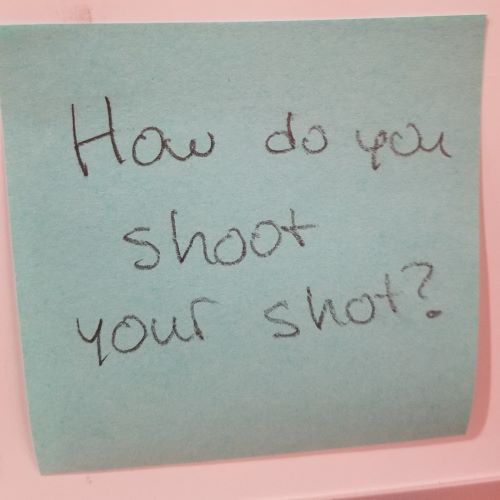
Move into space, aim, press circle (sometimes square), and hope for the best. If I score, I celebrate. If I miss, I blame scripting.
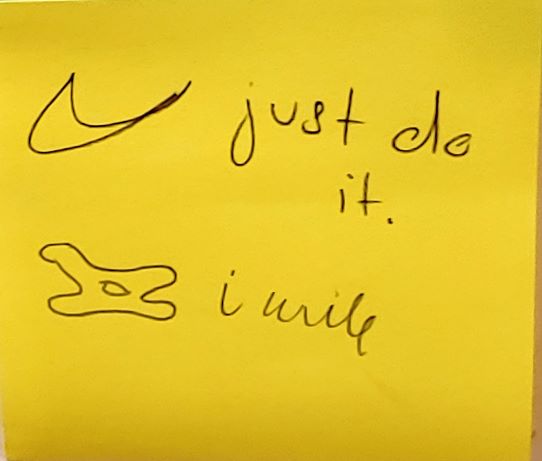
There’s an interesting rumor involving the two brands. Supposedly, Stephen Curry lost interest in becoming a Nike athlete after a disatrous presentation intended for Kevin Durant was mistakenly shown to him. While Nike has a well established reputation as an athletic apparel giant, it will be interesting to see how Under Armour tries to make a name for itself going forward.
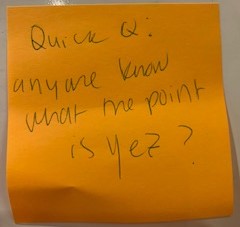
It’s okay if you don’t know what your point is, just know that everyone has a point. You’ll discover yours eventually- no rush. There is a great recording from 1970 called “The Point!” which uses a fable to say essentially that. Sadly, the library doesn’t own it, but there is a good plot synopsis here: en.wikipedia.org/wiki/The_Point!
![Do the ends justify the means? (...ever?) [Kant says no]](https://library.bc.edu/answerwall/wp-content/uploads/2019/11/AW11142019-04.jpeg)
Kant says no; that’s correct. Aristotle has some useful things to say on this matter, too, in the Nicomachean Ethics (O’Neill Library B430.A5): action falls in a situation-dependent range, and virtuous action generally falls somewhere in the middle–the “golden mean” (e.g., neither overly brave nor overly timid, but adapted to the needs of the situation). You could take a deeper dive into ethics by looking up virtue ethics, deontological ethics (duties and rules) and consequentialism in the Stanford Encyclopedia of Philosophy (plato.stanford.edu).
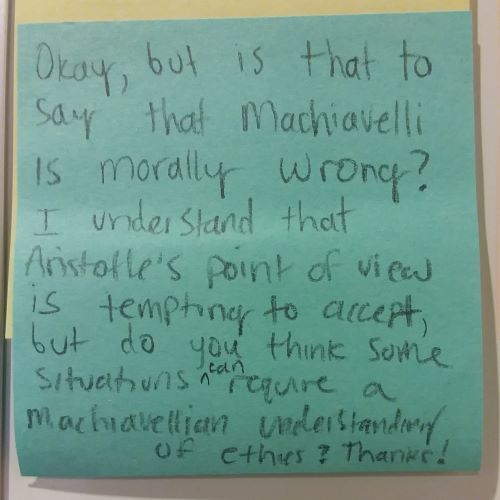
Though there are some philosophers who argue that Machiavelli is not merely a political and historical thinker, but a political philosopher, few would credit him with a consistently reasoned ethic. Read this entry in the Stanford Encyclopedia of Philosophy: bit.ly/SEP-machiavelli. He was concerned primarily with the behaviors of heads of non-democratic states, who, he argued, were not bound by the morals that constrained non-rulers. If this concern is important to you, I recommend a course in ethics in the philosophy department, such as Ethics of Peace and War or Ethics, Religion, and International Politics.
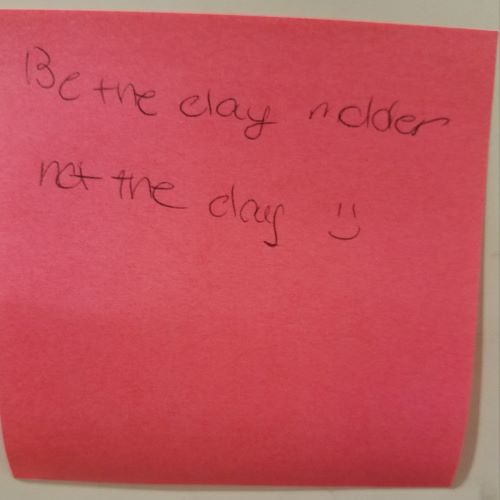
Words to live by. But just to say, the clays I know are very mature. Mineralogically speaking.
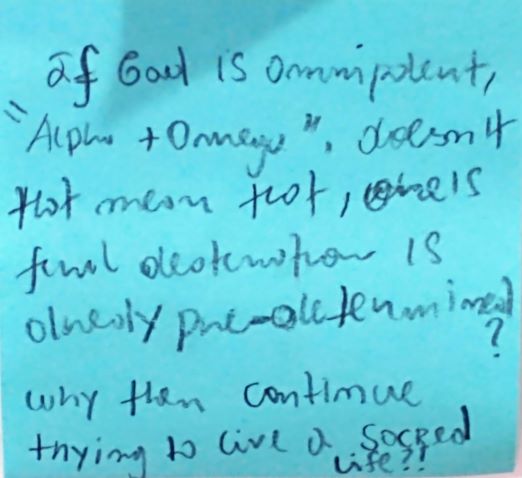
This is a subject of some debate in theological study. The idea of predestination, specifically that where people go after they die has already been decided by God is an idea they many believers don’t accept. Those who don’t agree with this way of thinking may prefer to give more credence to scripture, and the lessons that can be learned from it. As for the question of living in the event predestination were true, I would say everyone has priorities that more or less motivate their actions. While these priorities may not have much importance in regards to the afterlife, they may be important enough to dedicate time and energy towards while alive.
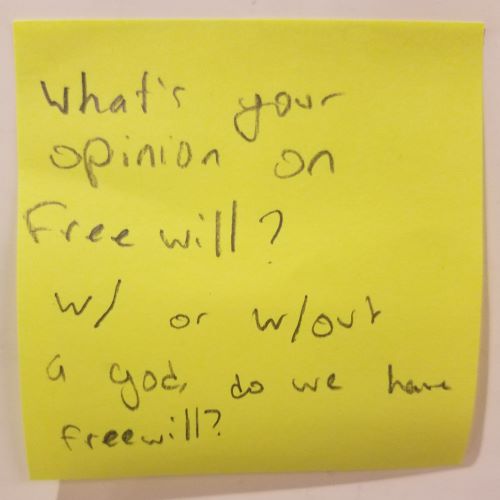
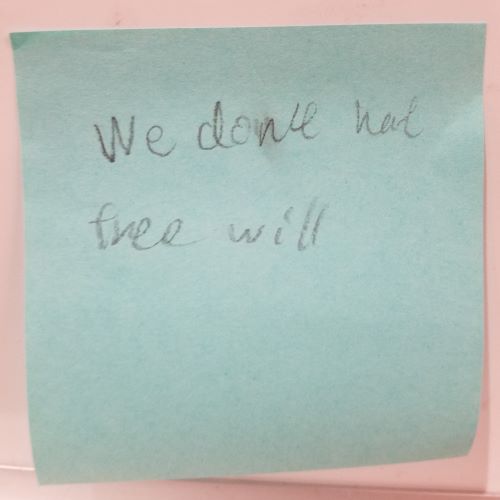
I believe everyone is free to believe whether or not they have free will. Although, I have to admit theories supporting the notion that people do not have free will are somewhat interesting. One example (from theosophy) is supposedly all events that have happened, are currently happening, and will happen are contained in a metaphysical database known as the Akashic Records. For more on free will, see the Stanford Encyclopedia of Philosophy entry: plato.stanford.edu/entries/freewill/
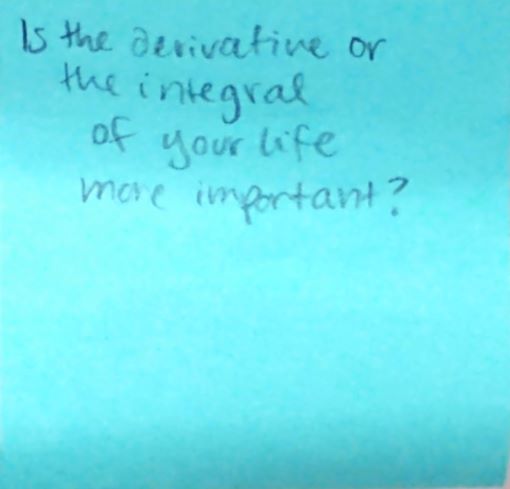
I’d say both, but in different ways. A derivative is going to tell you about what’s going on at a particular moment, and it’s important to live in the moment. But the whole area under the curve of your life is also important to show you the big picture. The derivative may cloud your mind during rough periods (“I’m going downhill fast!”), but integrating over the course of your life (with the limits being birth and death) can reassure you that this is just a phase.
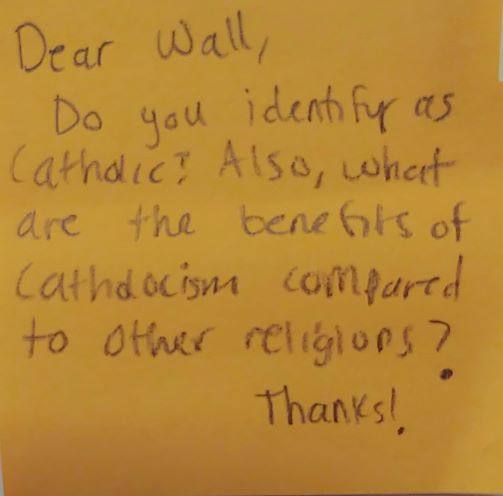
I’m here to be welcoming to all and I don’t want to give an answer that might make someone feel excluded, so I think I’d like to keep my religious beliefs a private matter. In terms of the other part of your question, my friends at Campus Ministry would be delighted to help you explore questions like that. bit.ly/BC-ministry
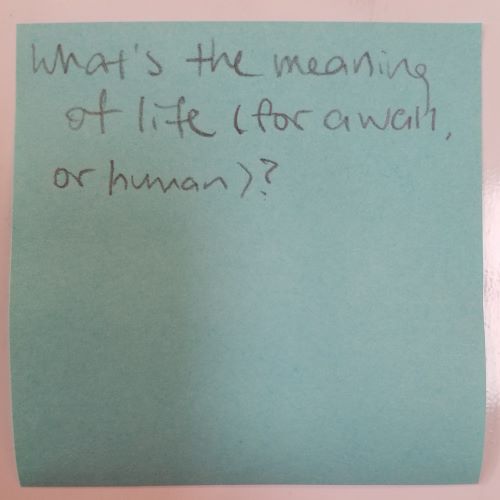
I’m rather fond of my answer to this question from September 2017, so I’m going to be mindful of recycle it: 42! (PR6051.D3352 H5 1989) In all seriousness, Frederick Buechner said in Wishful Thinking : A Seeker’s ABC (BR95 .B785 1993), “The place God calls you to is the place where your deep gladness and the world’s deep hunger meet.” which seems like a pretty good answer to this wall. A variation of this would be Fr. Michael Himes’ “Three Key Questions”: 1. What brings me joy? 2. What am I good at? 3. What does the world need me to be?
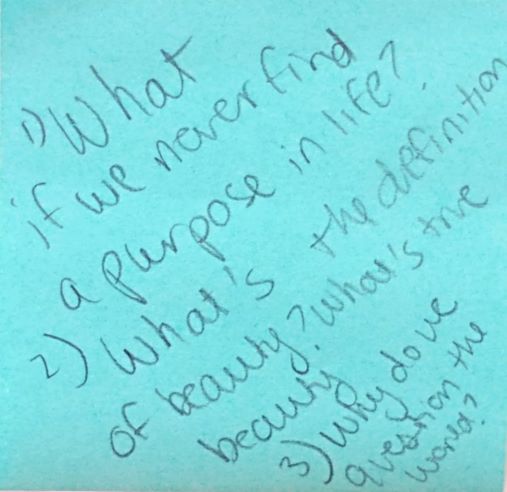
1) Trust that you will if you’re serious about finding it, 2) True beauty is simultaneously in the eye of the beholder and the heart of the beheld, even though that might cause contradictions, 3) We question the world because it’s full of contradictions and injustices.
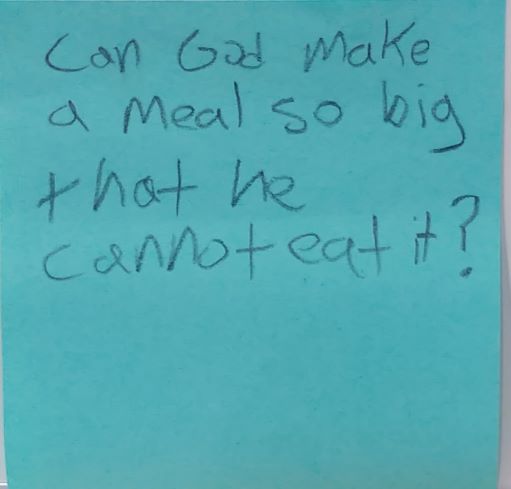
That is a delightful variation on a classic logic problem which lots of thinkers have addressed. It’s called the omnipotence paradox, and there are a variety of responses to it. Actually entertaining Wikipedia article: http://bit.ly/bc-omni. More technical discussion: bit.ly/bc-omni2. Aquinas argues that logic still applies: Even an omnipotent being can’t do something impossible. Augustine argues that God must act according to his nature, which means he can’t create anything omnipotent. The Wall’s favorite modern response is that the question is just a pile of words: if God is omnipotent, “could not eat” doesn’t make sense.
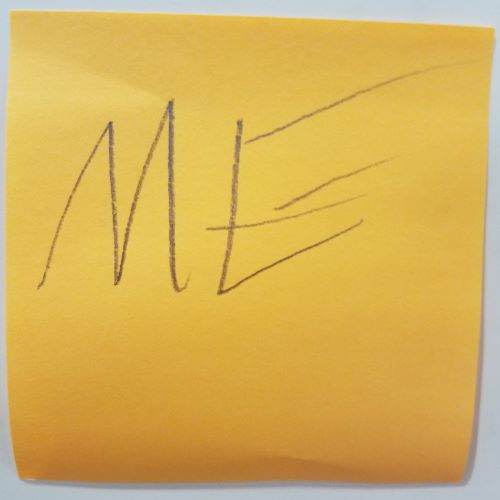
“Don’t you, forget about me.” My helpers tell me that 80s music has made a comeback.
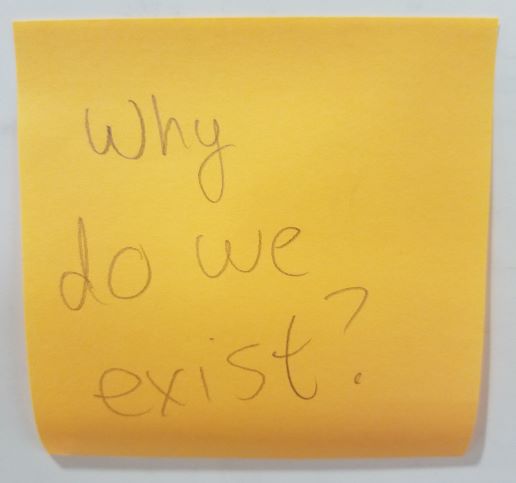
There are as many answers to this question as pages in this library, but they basically fall into two categories: teleological (related to purpose), or etiological (related to causes & origins). The first asks What is our purpose? and the second asks What caused us to be? Some might add a third category: phenomenological (related to experiences), which asks What is happening? You could do worse than to explore all three (teleology, etiology, and phenomenology) in the Stanford Encyclopedia of Philosophy: https://plato.stanford.edu. Me, I think we’re here to love.
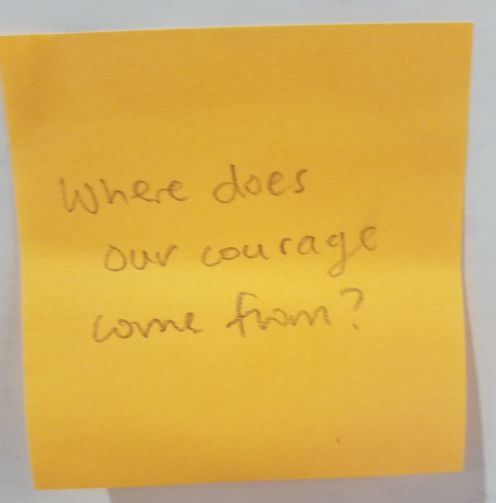
To understand where courage comes from, we must understand why we need it. In The Tragedy of Pudd’nHead Wilson… (PS1317 .A1 1996) Mark Twain wrote “Courage is resistance to fear, mastery of fear – not absence of fear.” In his sci-fi epic Dune (PS3558.E63 D8) Frank Herbert wrote, “Fear is the mind-killer…”. Fear can paralyze us into inaction, which is, itself, an action. Doing nothing is a decision. Courage comes from an instinctual unwillingness to do nothing when something needs to be done. Brene Brown has written some great books on courage and where it comes from (bit.ly/BC-brene-brown).
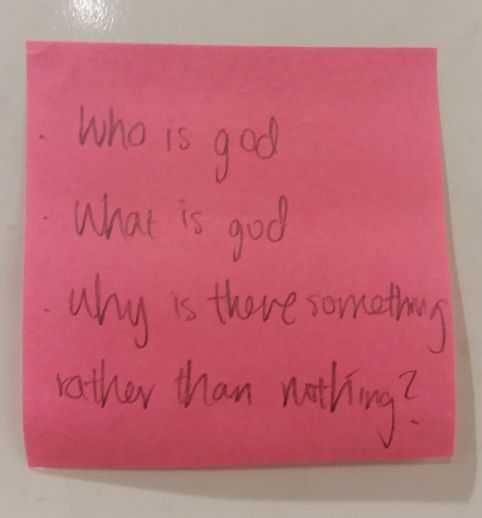
My creator was the architecture firm Architects Collaborative and my why is to provide support for all of the students at BC. As for humans (or the universe more generally), I may have to direct you to Campus Ministry (bit.ly/BC-ministry) to start you on your path to finding answers to these questions. Emphasis here on the word start since you’ll probably spend quite a bit of time trying to find an answer – if you ever do. Oh. Also. 42.
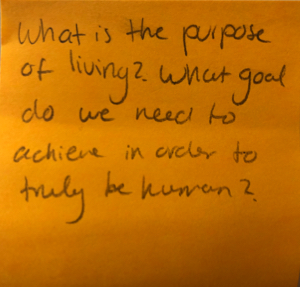
According to Anais Nin, “there is not one big cosmic meaning for all; there is only the meaning we each give to our life, an individual meaning, an individual plot, like an individual novel, a book for each person.” Following this concept, I believe that striving for self-fulfimment would be a good start.